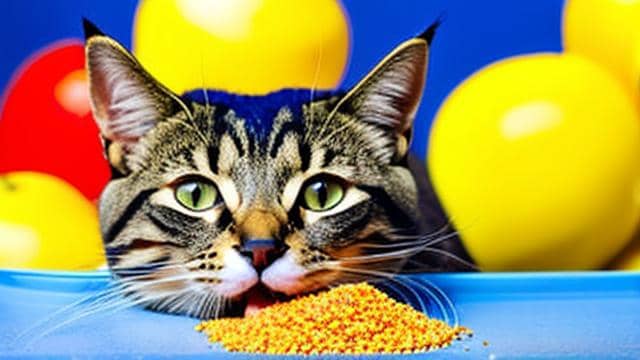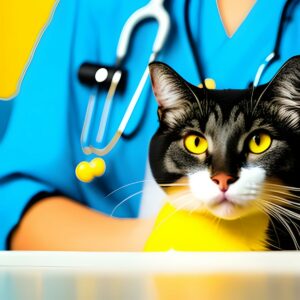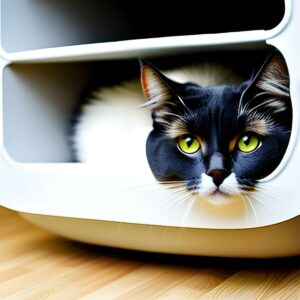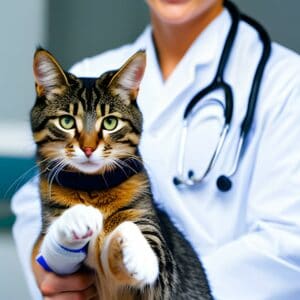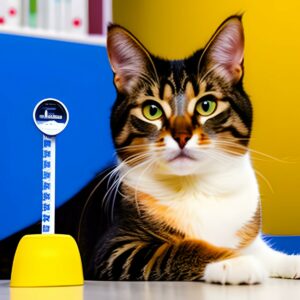According to the American Association of Feline Practitioners,
- approximately 50% of cats over the age of 10 will develop cancer,
- up to 90% of cats over the age of 12 showing signs of arthritis,
- up to 30% of cats over the age of 15 showing signs of kidney disease,
- up to 70% of cats over the age of 3 are showing signs of dental issues.
Statistics may seem scary but preventative care has become a key to keeping your cats healthy and happy for many years.
This is where we come in.
From addressing age-related health issues to adapting their diet to support their changing nutritional needs we will cover 18 essential tips for senior cat care, including tips for nutrition, health, and hygiene.
Whether you have a senior cat already or are preparing for the future, these tips will help you provide the best care possible for your furry friend.
So let’s scratch this guide and tips 🙂
Senior Cat Care Tips: Table of Contents
Senior cat care tips: Nutrition
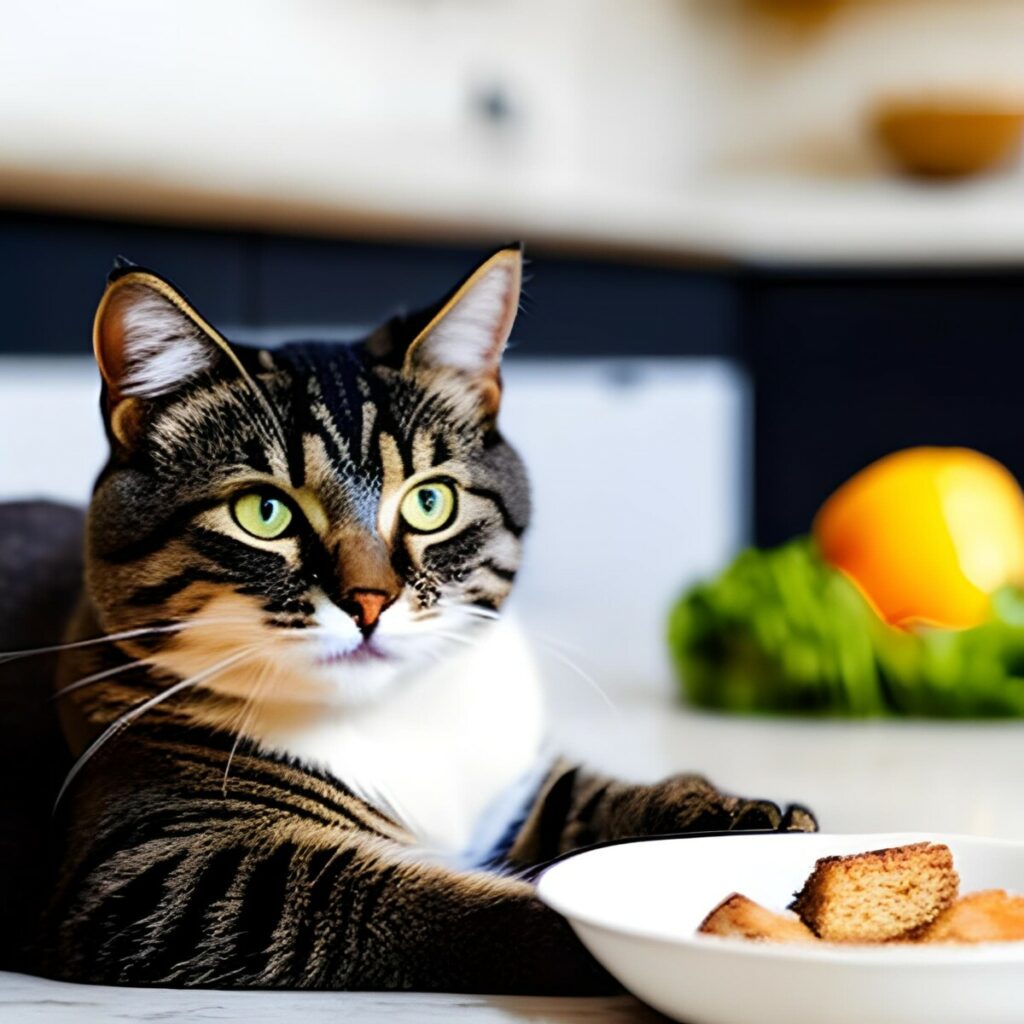
As feline companions age, their nutritional needs change, making senior cat diets crucial for maintaining their health, vitality, and longevity.
Here are some important considerations to keep in mind when it comes to senior cat nutrition:
Protein sources for senior cat
While older cats still require adequate protein to support their muscle mass, they need a high-quality and easily digestible source.
Here are some examples of protein sources that are well-suited for senior cat nutrition:
Poultry: Chicken and turkey are excellent sources of lean protein and are often used in senior cat diets.
Fish: Fish such as salmon, tuna, and sardines are rich in omega-3 fatty acids, which can help support healthy skin and coat.
Eggs: Eggs are a complete source of protein and contain essential amino acids that are important for senior cats.
Beef: Lean beef is a good source of protein and is often used in senior cat diets.
Calories: Since senior cats tend to be less active, they require fewer calories to maintain a healthy weight.
Fat: Although a moderate amount of fat is necessary for energy and promoting healthy skin and coat, overfeeding can increase the risk of obesity in senior cats.
Fiber sources for senior cat
Senior cats may benefit from a higher-fiber diet to support digestion and prevent constipation.
Here are some examples of fiber sources that are well-suited for senior cat nutrition:
Canned pumpkin: Canned pumpkin is an excellent source of fiber for senior cats. It is low in calories and can help prevent constipation.
Brown rice: Brown rice is a good source of fiber and can be included in a senior cat’s diet in small amounts.
Oatmeal: Oatmeal is a good source of soluble fiber, which can help regulate digestion and promote healthy bowel movements.
Psyllium husk: Psyllium husk is a natural source of soluble fiber that can help promote regularity in senior cats.
Vegetables: Some vegetables such as broccoli, green beans, and carrots are good sources of fiber and can be included in a senior cat’s diet in small amounts.
Moisture: Aging cats can have a reduced thirst drive, so it is important to provide them with adequate moisture through wet food or water added to dry food.
Supplements for senior cat

Some senior cats may require supplements such as joint support or antioxidants to maintain their health and well-being.
Here are some examples of supplements that are commonly recommended for senior cats:
Joint supplements: Senior cats may experience joint pain or stiffness due to age-related arthritis. Supplements such as glucosamine and chondroitin can help support joint health and mobility.
Omega-3 fatty acids: Omega-3 fatty acids, found in fish oil and other supplements, can help support healthy skin and coat, as well as cognitive function in senior cats.
Probiotics: Probiotic supplements can help support digestive health in senior cats by promoting the growth of beneficial gut bacteria.
Antioxidants: Antioxidant supplements such as vitamins E and C can help support immune function and overall health in senior cats.
Your vet will know the exact nutritional needs of your senior cat, so it is best to consult before adding supplements or vitamins.
Senior cat nutrition takeaways
- Choose a high-quality, senior-specific cat food formulated with high-quality protein, healthy fats, vitamins, and minerals.
- Ensure adequate hydration and access to clean, fresh water. Consider using a pet water fountain or adding wet food to their diet to increase hydration.
- Monitor calorie intake and talk to your veterinarian about calorie intake for your senior cat, measure portions to avoid overfeeding.
- Consider supplements to support mobility, or supplements to support kidney or heart health. Talk to your veterinarian about which supplements may be appropriate for your senior cat.
- Be aware of special dietary needs such as diabetes or kidney disease.
- Monitor weight and body condition to identify any changes or health issues early on.
Senior cat care tips: Health
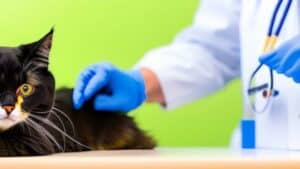
Senior cats are more prone to chronic health issues, such as arthritis, kidney disease, dental problems, and diabetes.
You should visit the veterinarian at least once a year for a thorough physical exam, blood work, and other diagnostic tests. Early detection and treatment of health issues can help improve outcomes and ensure that your cat remains healthy.
Here are common health issues in senior cats:
Arthritis in senior cats
Arthritis is a chronic, degenerative joint disease that causes significant discomfort, pain, and stiffness in the joints, making it difficult for cats to move around and perform their regular activities.
Arthritic cats may also show signs of:
- reluctance to jump, climb or play,
- or they may experience difficulty in accessing their litter box or grooming themselves.
Arthritis management and treatment can improve a senior cat’s quality of life and help them stay comfortable and active.
Dental disease in senior cats
Older cats become more susceptible to dental problems, such as:
- periodontal disease,
- gingivitis,
- tooth decay.
If left untreated, dental disease can lead to tooth loss, gum disease, and other health issues that can compromise a senior cat’s overall health and well-being.
Symptoms of dental disease in senior cats may include:
- bad breath,
- drooling,
- difficulty eating or chewing,
- swollen or bleeding gums,
- loose or missing teeth.
Dental cleanings and check-ups, regular brushing, and senior cat foods that are specially formulated to promote dental health are essential to prevent dental problems and catch them early on.
Kidney disease in senior cats
Kidneys play an important role in filtering waste products from the blood and regulating fluid balance in the body. As cats age, their kidneys may begin to function less efficiently, leading to the development of chronic kidney disease (CKD).
Symptoms of kidney disease in senior cats may include:
- increased thirst,
- decreased appetite,
- weight loss,
- lethargy,
- vomiting,
- increased urination.
If left untreated, kidney disease can lead to serious health complications, such as anemia, high blood pressure, and fluid buildup in the body.
Early detection and management of kidney disease are crucial to maintaining a senior cat’s health and prolonging their lifespan. This may involve regular monitoring of kidney function through blood and urine tests, as well as dietary modifications and medication to manage symptoms and slow the progression of the disease.
There are also many things you can do at home to support your senior cat’s kidney health, such as providing fresh, clean water at all times, feeding a high-quality, kidney-friendly diet, and keeping a clean litter box to encourage regular urination.
Diabetes in senior cats
Diabetes occurs when the body is unable to regulate blood sugar levels effectively, resulting in high blood sugar levels that can cause a range of symptoms and health problems.
Senior cats are at an increased risk for developing diabetes due to:
- obesity,
- sedentary lifestyles,
- hormonal changes associated with aging.
Symptoms of diabetes in senior cats may include:
- increased thirst,
- frequent urination,
- weight loss,
- increased appetite,
- lethargy
If left untreated, diabetes can lead to serious health complications, such as blindness, kidney disease, and nerve damage. Management of diabetes in senior cats typically involves dietary modifications, regular exercise, and insulin therapy to regulate blood sugar levels.
It’s important to work closely with your veterinarian to develop a diabetes management plan that is appropriate for your senior cat’s needs and health status. Regular monitoring of blood sugar levels, as well as regular check-ups to assess the progression of the disease and monitor for complications, are essential for maintaining a senior cat’s health.
In addition to medical management, there are many things you can do at home to support your senior cat’s diabetes management, such as feeding a low-carbohydrate, high-protein diet, providing opportunities for exercise and play, and maintaining a consistent daily routine.
Hyperthyroidism in senior cats
The thyroid gland produces hormones that regulate metabolism, and when it becomes overactive, it can cause a range of symptoms:
- weight loss,
- increased appetite,
- vomiting,
- diarrhea,
- hyperactivity,
- increased thirst,
- increased urination.
If left untreated, hyperthyroidism can lead to serious health complications such as heart disease and kidney damage.
Management of hyperthyroidism in senior cats typically involves medication, dietary modifications, and/or radioactive iodine therapy to regulate thyroid function and control symptoms.
Regular monitoring of thyroid hormone levels, as well as regular check-ups to assess the progression of the disease and highly encouraged by vets.
In addition to medical management, there are many things you can do at home to support your senior cat’s hyperthyroidism management, such as feeding a high-quality, low-iodine diet, providing opportunities for exercise and play, and maintaining a consistent daily routine.
Cancer in senior cats
Like humans, cats can develop a range of different types of cancer, including lymphoma, leukemia, and various types of solid tumors.
Symptoms of cancer in senior cats can vary depending on the type and location of the cancer but may include:
- weight loss,
- loss of appetite,
- lethargy,
- vomiting,
- diarrhea,
- difficulty breathing,
- presence of lumps or bumps.
If cancer is suspected in a senior cat, it’s important to work closely with a veterinarian to determine the best treatment options.
Cancer treatment in senior cats may include surgery, chemotherapy, radiation therapy, or a combination of these treatments. Palliative care may also be recommended to manage symptoms and maintain a cat’s quality of life.
In addition to medical management, there are many things you can do at home to support your senior cat’s cancer management, such as providing a comfortable and stress-free environment, offering a high-quality diet, and providing plenty of opportunities for rest and relaxation.
Cognitive Decline in senior cats
Cognitive decline, also known as cognitive dysfunction syndrome or simply cognitive decline, is a condition caused by changes in the brain that lead to a decline in memory, learning, and problem-solving abilities.
Symptoms of cognitive decline in senior cats can vary but may include:
- confusion,
- disorientation,
- changes in behavior,
- increased vocalization,
- decreased social interaction,
- changes in sleep-wake cycles.
These symptoms can be distressing for both cats and their owners and can significantly impact a cat’s quality of life.
There is no cure for cognitive decline in senior cats, but there are many things that can be done to help manage the condition and maintain a cat’s quality of life.
Management strategies may include environmental enrichment, such as providing opportunities for play and mental stimulation, maintaining a consistent daily routine, and providing a comfortable and stress-free environment.
In addition to environmental modifications, some prescription (selegiline) medications and supplements (omega-3 fatty acids and antioxidants) may be recommended to help manage cognitive decline in senior cats.
Senior cat health takeaways
- Regular veterinary check-ups are a must, ideally every six months for early detection and treatment of any health issues.
- Monitor weight and body condition to identify any changes or health issues early on.
- Provide dental care and regular dental cleanings to help prevent dental disease and maintain oral health.
- Exercise is still important for their physical and mental health. Encourage playtime and provide toys to keep your senior cat active and engaged.
- Environmental enrichment can help prevent cognitive decline and promote overall health and well-being. Provide scratching posts, perches, and hiding places, and rotate toys regularly to keep your senior cat engaged.
- Manage any chronic health condition by ensuring that the senior cat is receiving appropriate treatment and care.
Senior cat care tips: Grooming and Hygiene
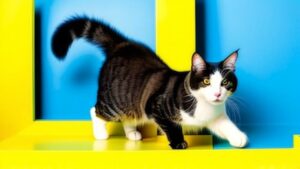
Elderly cats may become less able to groom themselves effectively, which can lead to matting, skin irritations, and other health issues.
To help maintain good grooming and hygiene in senior cats, provide regular brushing and combing, especially for cats with long hair. This can help to remove loose fur and prevent matting, which can be painful and uncomfortable for cats.
Regular dental care is also an important aspect of grooming and hygiene in senior cats. Dental disease is common in senior cats and can lead to a range of health issues, including tooth loss, gum disease, and even systemic infections. To help maintain good dental health in senior cats, it’s important to provide regular teeth brushing, dental cleanings, and other dental care as recommended by a veterinarian.
Brush and comb regularly to remove loose fur, prevent matting, and distribute natural oils throughout the coat.
Clean ears with a gentle ear-cleaning solution and a soft cotton ball but be careful not to go too deep
Brush teeth with a pet-specific toothbrush and toothpaste to prevent dental issues.
Bathe with gentle pet shampoo and warm water, and be sure to rinse the cat thoroughly.
Be gentle and patient with senior cats who are more sensitive during grooming. Take breaks as needed, and provide treats and positive reinforcement to help make grooming a positive experience.
Senior cat grooming and hygiene takeaways
- Brushing helps to remove loose hair and prevent hairballs. For senior cats with arthritis or other mobility issues, use a soft-bristled brush or grooming glove to minimize discomfort.
- Bathe your cat with cat-specific shampoo.
- Trim the nails: Overgrown nails can be painful and cause difficulty walking, especially for senior cats. Regular nail trimming can help prevent these issues.
- Eye and ear cleaning with a damp cloth and drops helps prevent infections.
- Anal gland expression should be done by the vet, or your veterinarian can show you how to safely express your cat’s anal glands.
- Consider providing a litter box with lower sides, or a litter box with a ramp or steps to make it easier for your senior cat to use.
Caring for a senior cat requires a bit of extra effort and attention, but the rewards are well worth it.
By following these 18 essential tips for senior cat care, cat owners can help ensure that their furry companions remain happy, healthy, and comfortable in their golden years.
Remember to always consult with your veterinarian for personalized advice and guidance on how to best care for your senior cat. With the right care, your senior feline companion can continue to bring joy and companionship for many years to come.
My Senior Paws is a participant in the Amazon Services LLC Associates Program, an affiliate advertising program designed to provide a means for sites to earn advertising fees by advertising and linking to Amazon.com. We also participate in other affiliate programs which compensate us for referring traffic.
